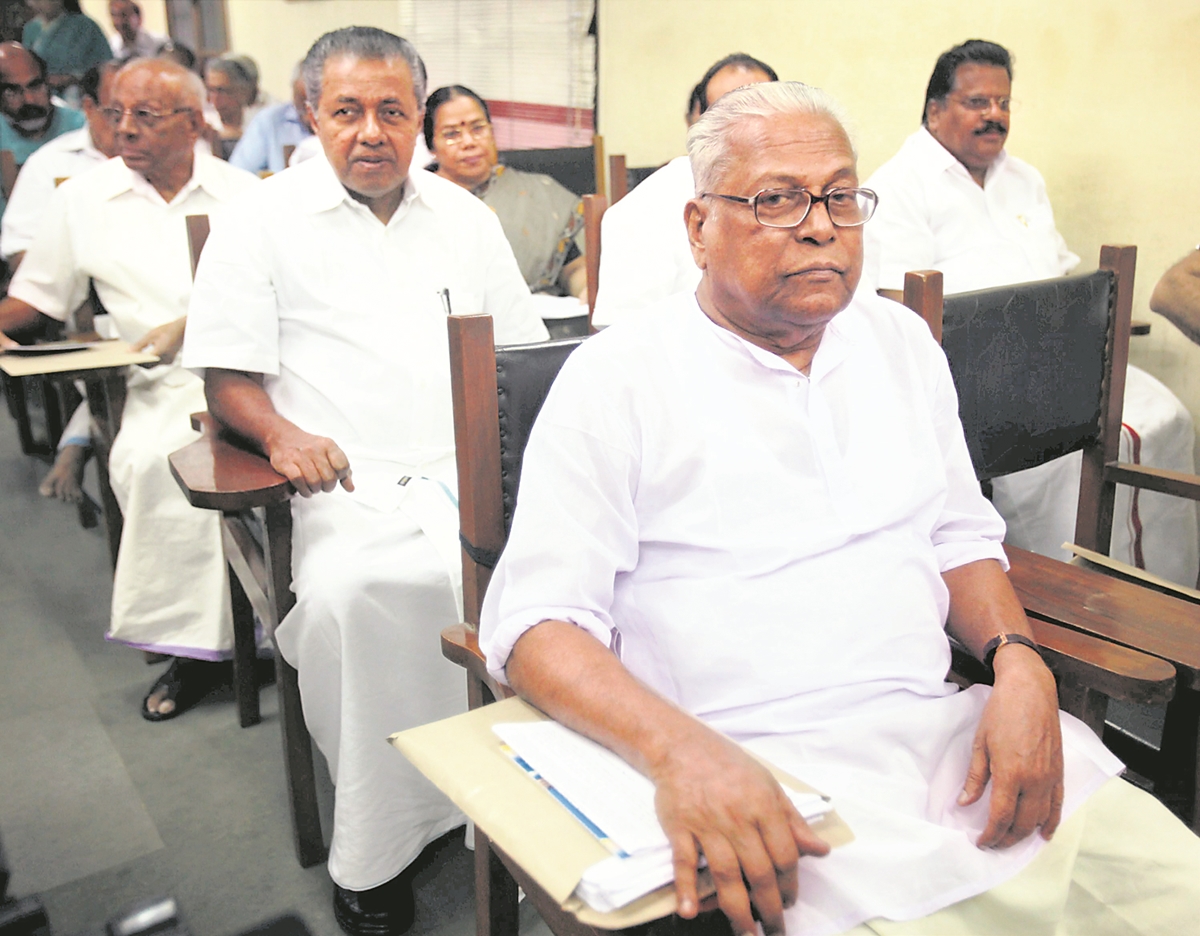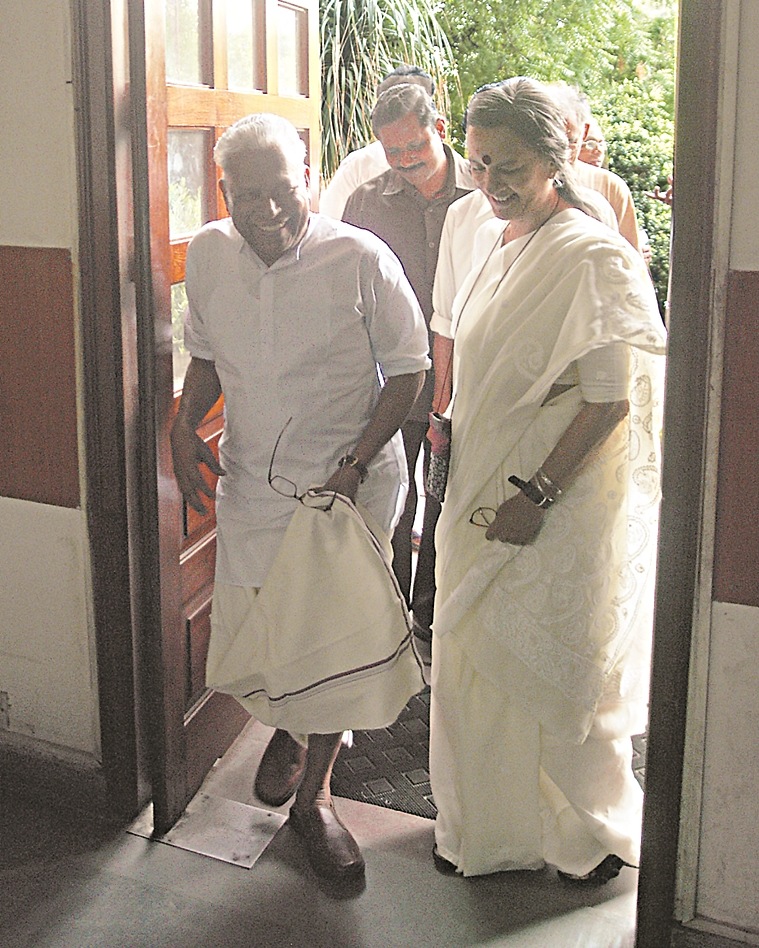Latest Comment
Post Comment
Read Comments
 V S Achuthanandan served as the chief minister of Kerala for a term from 2006 to 2011.
V S Achuthanandan served as the chief minister of Kerala for a term from 2006 to 2011.Communist veteran and former Kerala chief minister V S Achuthanandan turned 99 Thursday, October 20. The veteran who straddled the state’s socio-political scene as VS has been keeping away from active politics for the last four years after suffering a stroke.
VS served as the chief minister of Kerala for a term from 2006 to 2011 and as Opposition leader for three terms — 1991-1996, 2001-2006 and 2011-2016. The mass leader, a rare one to attain cult status in state politics, was also the chairman of the state administrative reforms commission between 2016 and 2021 during the previous regime of the Left Democratic Front (LDF).
His eight-decade-long political life, dating back to pre-Independence days, inarguably, lies inextricably intertwined with the socio-political history of Kerala. There is no other politician in the state like VS, who had many identities such as a copy-book Communist and a crowd-puller who helped the party win elections.
 V S Achuthanandan, Pinarayi Vijayan and other leaders at a Central Committee meeting in New Delhi in 2009. (Express Archive)
V S Achuthanandan, Pinarayi Vijayan and other leaders at a Central Committee meeting in New Delhi in 2009. (Express Archive)
Born on October 20, 1923, in the Punnapra village in Alappuzha district, V S Achuthanandan lost his mother at the age of four and his father when he turned 11. He dropped out of school as a Class 7 student to scout for livelihood and the 12-year-old boy started working at his elder brother’s tailoring shop.
He joined the Congress when he was 15 but became a member of the undivided Communist Party of India (CPI) two years later at the age of 17. He worked among fishermen, toddy-tappers and coconut climbers of Alappuzha.
In 1940, he joined a coir factory in Alappuzha and it was here that comrade P Krishna Pillai, whom he had met a year ago, urged him to organise the “real working class” — the farm workers of Kuttanad in Alappuzha. His first mission, assigned by then political mentor Pillai, was to bring the coir workers closer to the Communist movement.
“Those have been tough days. In the early 1940s, I would stay in a house at Cherukara in Alappuzha for party work. The house was located in a paddy field with streams. I would walk kilometres along narrow ridges to reach workers. There were no bridges across these streams, only wooden planks,” VS had recalled those years in trade union activities.
It was during this time VS was said to have mastered his famous diction — halting and winding – that later became fodder for Kerala’s mimicry artists. This style was indeed necessitated by the times when one had to address workers spread over vast paddy fields without any public address systems.
When the Alappuzha district was formed, VS became the CPI district secretary. In 1954, he became a CPI state committee member and three years later, a state secretariat member. He is the only living politician from Kerala who was among the 32 CPI leaders who walked out of the party’s national council to form the CPI(M) in 1964.
He got elected to the state Legislative Assembly in 1967 and 1971 but returned to organisational politics in 1980 when he was elected as the CPI (M) state secretary. He remained in that powerful post for 12 years till 1992 at a time the party had veterans such as E M S Namboodiripad and E K Nayanar as influential leaders.
VS’s long innings as party state secretary revealed the traits of uncompromising, inflexible political stubbornness in his style of functioning. In 1986, the Stalinist in VS worked behind the ouster of M V Raghavan, then a powerful leader from party citadel Kannur, on charges of proposing to get the Muslim League to the LDF camp. In 1994, VS, who belongs to the backward Hindu Ezhava community, was instrumental in the dismissal of firebrand communist leader K R Gouri Amma, who also belonged to the Ezhava community.
 Former Kerala CM V S Achuthanandan and CPI(M) leader Brinda Karat at the party office in New Delhi in 2007. (Express Archive)
Former Kerala CM V S Achuthanandan and CPI(M) leader Brinda Karat at the party office in New Delhi in 2007. (Express Archive)
After his first innings as Leader of the Opposition for five years from 1991, VS contested the elections of 1996 with the ambition to become the chief minister. Though the party had a roaring victory, VS lost in party stronghold Mararikulam, which later emerged as the biggest shocker for the veteran Marxist strategist. VS did not flinch in the intra-party battle. He prevented Marxist woman Susheela Gopalan, wife of party legend A K Gopalan, from becoming the chief minister.
The loss in the Assembly election and two consecutive defeats to the post of party state secretary, in 1992 and 1995, hurt him. In the state conference held in 1998, he virtually decimated the rival group of the Centre of Indian Trade Unions (CITU), demonstrating his clout in the party. The careers of several prominent leaders were bulldozed in the juggernaut of VS, who then got the backing of several young leaders of the time like Pinarayi Vijayan, who was then a VS loyalist. But, Achuthanandan’s bonhomie with Vijayan did not last long as the latter got closer to then chief minister E N Nayanar.
What was in store for CPI(M) politics in Kerala for the years to come was the bitter feud between VS and Vijayan, which kept erupting frequently giving regular fodder for the media. The power struggle had threads of personal animosity and ideological differences.
While VS wanted to remain a copybook communist, Vijayan wanted to sail with neo-liberal policies. His five years as Opposition leader from 2001 to 2006 marked his makeover from a ruthless communist to the last hope of the mass. He started by taking on the scandals involving the ruling Congress and systematically built up an image of a crusader against corruption and social evils. Those were the days when Kerala had witnessed a series of sex scandals allegedly involving senior politicians, encroachment on forest land and the growth of an assortment of mafia in social life. VS promptly plunged into every such issue, toured across the state, visited ground zero of protests and stood with mass sentiments on all issues. “Those engaged in sex trafficking and molesting minors would be handcuffed and paraded along streets,’’ was his refrain which appealed to the masses.
It was this rebranding from a Stalinist apparatchik to an affable mass leader that gave VS a cult status. However, he was pulling apart from the party in which Vijayan had been growing his clout rapidly. Even engaging with public issues, VS opened a war front with the party against Vijayan. The orthodox communist locked horns with the party over external funding, hobnobbing with the capitalists.
By the time of the Assembly elections in 2006, VS had emerged as a redoubtable political phenomenon, banking upon his mass appeal. But the party, led by Vijayan, did not want to field VS for the election but was forced to change at the last moment as cadres went to the streets in protest against the denial of a seat to the crowd puller.
The LDF regime, led by VS from 2006 to 2011, did not have smooth sailing. He locked horns with his cabinet colleagues, mostly Vijayan loyalists, on several policy matters. While the party wanted to bring in changes on several fronts, VS remained sceptical, delaying several projects. He opposed several industrial projects, which the party wanted to execute.
VS was more and more isolated in the party with every passing skirmish while his rival Vijayan won over even the veteran’s loyalists. However, VS remained the most appealing CPI(M) leader and even rivals in the party banked on his popularity to win votes. In all elections in Kerala in the last two decades, VS has been the only crowd-puller campaigner for the CPI (M) as well as the LDF.
Even in 2016, when Vijayan contested the elections, VS was the face of the party’s campaign. He made public his intention to become the chief minister again. But after the party decision went in favour of Vijayan, VS was rehabilitated as the chairman of the newly-formed administrative reforms commission with a cabinet rank.
After Vijayan became the chief minister in 2016, CPI(M) general secretary Sitaram Yechuri said, “VS is the Fidel Castro of Kerala. He will continue to guide and inspire the party.”
As a legislator from the Malampuzha constituency, VS was active in the state Assembly during the last government’s regime too.